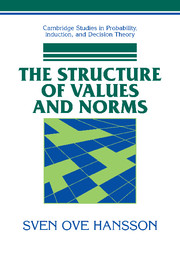13 - Legal Relations
Published online by Cambridge University Press: 13 August 2009
Summary
One of the most interesting applications of deontic logic is to use it for the characterization and classification of legal relations such as rights, claims, and powers. In Section 13.1, the formal framework from Chapter 12 is supplemented in order to express the dependence of norms on symbolic actions recognized by law. In Section 13.2, a typology of legal relations is introduced, and in Section 13.3 it is used in an analysis of the concept of a right. Section 13.4 is devoted to a comparison of the present framework with Wesley Hohfeld's classic typology of legal relations.
POTESTATIVE RULES
Several authors, notably Stig Kanger, Frederick Fitch, and Lars Lindahl, have used deontic logic to characterize and classify legal relations. The basic framework, first developed by Stig Kanger, makes use of two operators: a prescriptive predicate O and a dyadic action predicate E, such that Eip means “i sees to it that p.” The atomic sentences on which the classification is built have the form [¬]O[¬]Ei[¬]p, where [¬] is a placeholder that can either be deleted or replaced by a negation sign. (Hence, OEi¬p and ¬O¬Eip are atomic sentence types in this language, and there are six others.)
These systems are clarifying in important respects, but there are non-negligible features of actual legal relations that they do not cover. Perhaps foremost among these is that many norms are activated by symbolic actions of different kinds, typically (but not exclusively) by speech acts such as those of claiming, ordering, and permitting.
- Type
- Chapter
- Information
- The Structure of Values and Norms , pp. 208 - 222Publisher: Cambridge University PressPrint publication year: 2001

